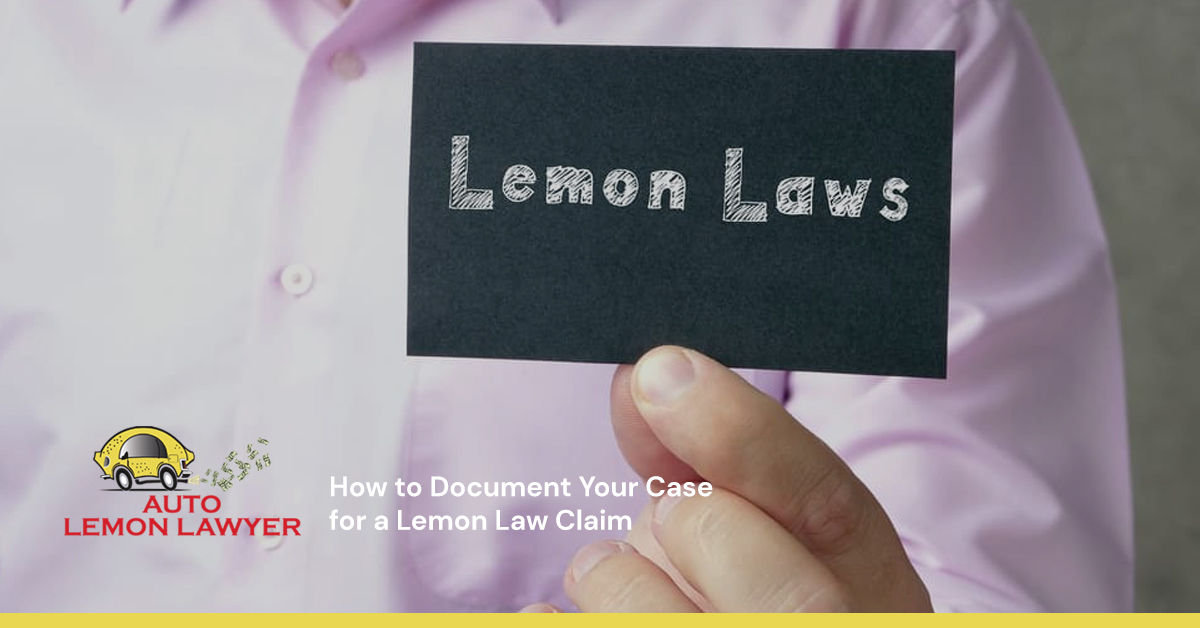If you’ve purchased a new vehicle that turns out to be defective, you may have a “lemon” on your hands. Lemon laws exist to protect consumers who buy or lease vehicles with serious defects that can’t be repaired after a reasonable number of attempts. These laws vary by state but generally require the manufacturer to either replace the vehicle or provide a refund if the defects can’t be fixed.
To pursue a lemon law claim, you’ll need to carefully document the issues with your vehicle. An experienced auto lemon attorney can guide you through the process and seek the legal relief you deserve.
Understanding Lemon Laws

Lemon laws hold automakers accountable for selling defective vehicles to consumers. While the specifics vary, most state lemon laws have a few key provisions:
- The vehicle must have a substantial defect that impairs its use, value, or safety. Minor issues typically don’t qualify.
- The manufacturer’s warranty must cover the defect. Problems caused by abuse, neglect, or unauthorized modifications are excluded.
- The manufacturer must have a reasonable number of attempts to fix the defect. This is often three to four repair attempts for the same problem.
- The vehicle must be out of service for repairs for a certain number of days, often 30 days or more.
If your vehicle meets these criteria, you may be entitled to a refund or replacement under the lemon law. However, you’ll need to provide evidence to support your claim. That’s where documentation comes in.
When to Start Documenting
Ideally, you should start documenting issues with your vehicle as soon as you notice them. Don’t wait until the problem becomes severe or the vehicle is undriveable. Keep a log of any concerning symptoms, even if they initially seem minor. This will help establish a pattern of defects if the issues worsen over time.
Staying Organized
With so much information to track, organization is key. Set up a file folder or binder to keep all your vehicle records in one place, including:
- The sales contract or lease agreement
- Warranty information
- Owner’s manual
- Repair orders and invoices
- Correspondence with the manufacturer or dealer
- Notes on symptoms and malfunctions
Consider creating a spreadsheet to track repairs, time out of service, and expenses. This will make it easier to tally up the total days and dollars for your claim.
You may also want to keep a journal or log of your experiences with the vehicle. Write down any problems you notice and how they impact your use and enjoyment of the vehicle. This can help show the emotional toll of dealing with a lemon.
When to Seek Legal Help
Pursuing a lemon law claim can be a complex and time-consuming process. If you’re feeling overwhelmed or unsure of your rights, it may be time to consult an auto lemon lawyer.
An experienced attorney can review your case and advise you on the strength of your claim. They can also handle communication with the manufacturer and negotiate a settlement on your behalf. In many cases, the manufacturer may have to pay your attorney fees if you prevail in your lemon law claim.
Look for an auto lemon lawyer with experience with cases like yours and a track record of success. Many offer free consultations so you can get an initial assessment of your case without obligation.
Building Your Lemon Law Claim

Once you’ve gathered your documentation and consulted with an attorney, it’s time to build your lemon law claim. Your lawyer can draft a demand letter to the manufacturer that outlines the following:
- The substantial defect in the vehicle
- The repair attempts made by the dealer
- The time the vehicle was out of service
- Your demand for a refund or replacement
The demand letter starts the clock ticking on the manufacturer’s response. If they fail to offer an appropriate remedy, your attorney can file a legal claim.
In building your case, your lawyer will rely heavily on the documentation you’ve gathered. The more detailed and organized your records, the stronger your claim will be. Your attorney may also consult with expert witnesses, such as automotive engineers or mechanics, to provide testimony on the severity of the defect.
Negotiating a Settlement
In many cases, the manufacturer may offer a settlement before the case goes to trial. This can include:
- Replacing the vehicle with a new, comparable model
- Refunding your purchase price, minus a deduction for use
- Repairing the vehicle at no cost to you
- Extending the warranty
Your attorney will review any settlement offers and advise you on whether they’re fair and reasonable. They’ll also negotiate with the manufacturer to try to get you the best possible outcome.
Your case may proceed to trial if a settlement can’t be reached. Your attorney will present evidence and argue your case before a judge or jury. If you prevail, the court may order the manufacturer to replace your vehicle, refund your money, and award additional damages.
Tips for Success
To give yourself the best chance of success in your lemon law claim, keep these tips in mind:
- Read your warranty carefully. Make sure you understand what’s covered and what’s not.
- Follow the manufacturer’s maintenance schedule and keep records of all oil changes, tire rotations, and other required services.
- Report problems promptly. Don’t let defects go unaddressed in hopes they’ll resolve on their own.
- Be persistent. If the dealer fails to fix the problem, keep taking the vehicle back and insisting on a proper repair.
- Don’t make unauthorized modifications. Altering the vehicle can void your warranty and undermine your claim.
- Keep your cool. Dealing with a lemon can be frustrating, but stay calm and professional in your dealings with the manufacturer and dealer.
- Be honest. Don’t exaggerate or falsify information in your records or statements.
- Consult an attorney early. The sooner you get legal advice, the better positioned you’ll be to enforce your rights.
By following these tips and documenting your case carefully, you’ll be well on your way to getting the relief you deserve under your state’s lemon law.
Contact an Experienced Auto Lemon Lawyer
If you’re struggling to get the manufacturer to take your concerns seriously, an experienced auto lemon lawyer can be your best advocate. A lawyer can negotiate with the manufacturer and fight for your rights in court if necessary.
Don’t let a lemon sour your enjoyment of your new vehicle. Stand up for yourself and demand the reliable transportation you deserve.

Over the past 31+ years, I have been devoted to standing up for consumers, tackling intricate class action consumer litigations, handling complex multi-district cases, and recovering millions of dollars for my Lemon Law clients. Being admitted in District Courts in Louisiana, Texas, California, Michigan, Florida, and Indiana, my practice has led me to represent clients all over the United States in my Lemon Law cases. Regardless of your location, my firm is committed to offering the highest level of professional support, especially in Lemon Law.

